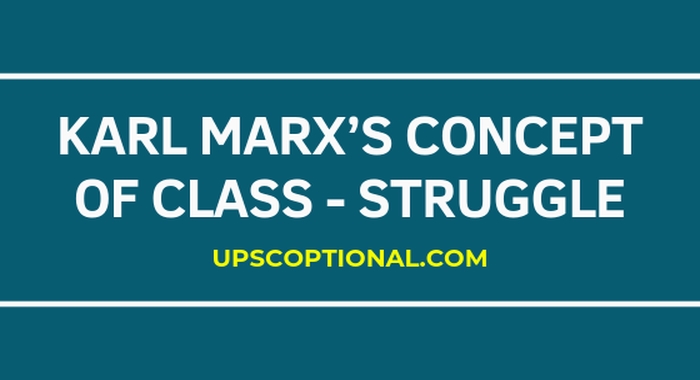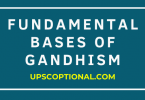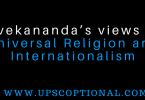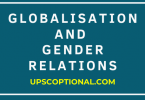Physical division causes class formation. Physical characteristics, intellectual specialities, religion, caste or sect are not the basis for class formation. He takes economic classes which develop due to production process. At the beginning every individual was satisfied by the gifts of nature, hence no problem arose. Hence production was responsible for division of society into different economic groups.
Thus there is a group of exploiters, rich and master of all means of production while politically they were the rulers. The other class was exploited, poor and governed under Federalism. There were traders and agriculturists. Modern capitalism has given capitalists and labour class.
Marx has mentioned three classes – labourers, capitalists and landowners respectively with powers on labour, capital and land while income depended on salary or wages, profit and rent respectively.
Now industrialization and division of labour has given differences in industrial and business labour and agricultural labour. But Marx does not see any differences as labour and capital or land are standing for capitalism.
Elements necessary for class – Social classes stand on the footing of economic differences. But Maclver and Page point out that class is not only based on economic differences but on social status. Robert Bierstedt describes seven factors to class – assigning.
- Property, wealth, capital and income
- Family or kinship group
- Place of residence
- Period of residence
- Occupation
- Education
- Religion
Evolution of Classes in Europe
Initially means of production were not under any authority hence no classification existed. It was the aboriginal communal age. People used to lead their life in forests by feeding on fruits and roots. Gradually farming and cattle rearing ushered and changed the living materials. The fights among groups led to murder of captives but slowly they were engaged for agriculture and cattle rearing as slaves. Hence ushered the age of slavery.
Ultimately feudalism appeared. The means of production and land was under feudal lords and landless farmers were used to work. Thus evolved two classes. This was prevailing in Europe till 19th century.
Finally, means of production took a turn a turn from land to commerce and smaller firms appeared. Labourers were serfs of feudalism. Money came to be utilized and capitalism was with the moneyed people and not land. Thus labourers used to get wages for work. Industrial revolution founded large scale productions.
Class Struggle – The communist manifesto has given the following words of Marx and Engels – Hitherto every form of society has been based on the antagonism of oppressing and oppressed classes.
Hence the two classes of exploiters and exploited were visible.
This means of production and opposition of production relationships gave both its utter limit of conflict. According to Marx, class struggle is compulsory in society. Till classes exist, the conflict will go on.
Modern Class Struggle – Industrialization, urbanization and transport facilities gave rise to capitalism. Monopolies and large scale production are visible. Capital leads to purchase labour at cheap rates and thus exploit. Monopoly reduces capitalists and small capitalists join the labourers due to defeat in business. According to Marx and Engels – “Society as a whole is more splitting into two great hostile camps, into two great classes directly facing each other – Bourgeoisie and Proletariat.”
Capitalism establishes new markets and develops transport means. This leads to mutual coming together of labourers of distant places and organize themselves. The more production leads to economic crises, Marxand Engle write –
What the bourgeoisie therefore produces, above all , are its own grave diggers. Its fall and the victory of the proletariat are equally inevitable.
Capitalists crush the labourers through state authority . They function through money. Men have no value. Exploitation is carried on through religion, politics and national development. While the labourers are exploited by reducing the price establishing new markets while labourers recourse to armed revolutionary conflict. As passive conflict can never gain success, the proletariat can change the social order through force.
Class struggle principle of Marx and Engels has international importance. As we see capitalism has spread the world over and there is unrest throughout the world and government change very often.
Revolution of proletariat signifies the uprooting of the whole administrative set up and establish the classless society giving the dictatorship under the proletariat. Communist manifesto gives in the end their objectives in the following words:
They openly declare that their ends can be attained only by the forcible overthrow of all existing social conditions, the proletarians have nothing to lose but their chains. They have a world to win.
Hence Marx and Engles theory of Class Struggle is similar to the theory of evolution which depends on struggle for existence and the theory of selection.
We can have the following points from the class struggle theory:
- Class struggle is the basic rule of human history which evolves changes.
- Class struggle is concerned with production process. New processes take the place of existing ones and so new classes displace the old ones. Hence there is revolution.
- Physical invention change the production process and substitute new classes. Exploited are also awakened towards changes in social order gradually. Revolution is not sudden but is the result of process.
- Ruling class, religion, tradition, philosophy, thought and education with propaganda attempt to keep authority steady. These all are related to specific production. The ruling classes own acceptances of religion and morality take the social form.
- Exploited or proletariat class tends to become more poor but well organized and powerful hence will revolt and had to establish classless society uprooting the capitalist class.
An Evaluation :
Marx has established the theory of class-conflict and motivated to make it effective through working. Philosophy was equipped with science. The exploited class was motivated to become rich from poverty, ruler from the ruled and powerful from powerless. We can witness today his propaganda and rule fruitful in the world’s large areas with communistic thoughts.
THE THEORY CAN BE CRITICIZED ON THE FOLLOWING GROUNDS :
- Class conflict is visible through all ages and every society but it is sudden and temporary. Human society progresses through cooperation and not conflict.
- He bases his economic views for all class- struggles. But we find great conflicts through religion, genus and national basis which had no explanation on economic grounds.
- There is no clear meaning to his bourgeoisie and proletariat class.
- Society consists of not only opposition class but there may not be any conflict among them. The society is seen in the USSR as a dream in truth accepts the theory of coexistence.






